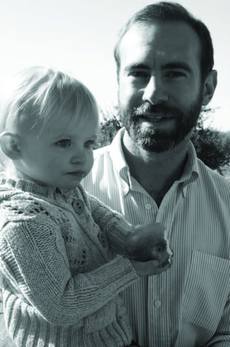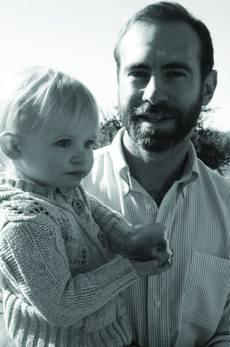
Photo courtesy of Jason Brozek (jason brozek)
Rachel Young: Tell me a bit about how you got started in teaching. Where did you get your undergraduate degree?
Jason Brozek: I got my undergraduate degree at a state school in Nebraska, Wayne State College. It’s actually a place that I picked because it was close enough to my parent’s farm so I could go back on the weekend. I was fortunately talked out of law school by my advisor, and she steered me towards grad school. I did my master’s and Ph.D. from the University of Wisconsin-Madison, where I got started teaching and doing research. I came to Lawrence because I wanted to go back to a liberal arts college like the one I had been to, so it was never my intention to stay very long at a big research institution.
Young: So did you study government the whole way?
Brozek: Actually, everywhere else it’s called political science, so yes, it was political science and philosophy – because metaphysics blew my 18-year-old mind and I loved it! Then, yes, political science at Madison [as well], and they call the political science department government here.
Young: Cool, so being from a farm in Nebraska, how did you end up with political science? Have you always been interested in it? Did your parents want you to go in that direction?
Brozek: Oh certainly not, my parents wanted me to stay there to combine soybeans . no, my dad said, “if you’re going to go to college, make sure you do it [to the best of your ability],” and so I think the implication was, you go all the way and when you’ve run out of degrees, then you can come back [home to the farm]. I have wanted to be a lawyer since I was about 12 which made me, God, incredibly nerdy. I read a book when I was a junior at Wayne State College called “Strategy of Conflict” by Thomas Shelling, and it changed my entire worldview about international relations. It made me realize for the first time that international relations could be more than just history and current events. There was more going on in international relations and that really stuck with me. In fact, that’s a book that I assign to my introduction to International Relations classes now because I’m hoping to recreate that [experience] for someone. But, for everyone else it’s just a good book, even if they don’t turn into a professor.
Young: As a Professor, you’re teaching about really charged topics for a lot of your students. How do you deal with your personal bias? Do you preface it, or do you keep it out of your classes? When you have students who feel really strongly one way or the other, how do you deal with that?
Brozek: That’s a good question! I actually gave my students in U.S. Foreign Policy an evaluation the other day, and I found it very rewarding that I had one complaint, that I was too conservative and another one that I was too liberal. That made me incredibly happy. The best thing I can do is try to convince students that personal ideology doesn’t matter all that much when we’re talking about political science. What we’re doing is scientific inquiry into political phenomena and not current events and not politics. [Personal bias] comes up all the time, so what I do is play devil’s advocate as often as I can and I think that’s where I end up getting students who think that I’m too liberal and students who think that I’m too conservative at the same time, and I find that very rewarding. If I can make it through a term and have students not realize what my personal politics are then I’d call that a success. If students ask me in my office then I don’t hide it from them, but I prefer to teach classes in a way that it doesn’t come up.
Young: So what do you think is a major world issue that students here should be aware of or perhaps what is your favorite world issue?
Brozek: Oh my gosh, are you giving me the freedom to talk about whatever I want to!? So, I think the issue is international fresh water. It’s an underappreciated problem. Everybody realizes that we’ve passed peak oil, and that we’re just about past the point where we can save the atmosphere from burning us all alive. But, there’s this incredible problem of international water and we’re overusing it. We’re running out so quickly and there’s no political interest internationally in solving this problem. The research project, my research that I’m working on right now is about international bodies of water. So rivers, lakes, aquifers that cross international borders and how those conflicts are managed. I think it’s an incredibly important problem that’s not getting enough attention internationally or academically.
Young: How far are you taking this project? Are you planning on publishing it, or doing any traveling for it?
Brozek: I’m going to two conferences in the spring to talk about some of my research and I have two articles in the process of submitting for publication. The end result would be a book about water sometime in the next two to three years. I am laying the groundwork to visit the Indus River sometime in 2010 with some students which I’m in the early stages of planning. I would be incredibly excited if we could find the funding and a way to take some students to India.
Young: Do you like being able to work closely with students on such projects?
Brozek: Absolutely, that’s absolutely one of the reasons why I wanted to come to a place like Lawrence. It’s incredibly rewarding to me to be able to walk down the hall and see students that I’ve worked with in class and on projects. I’ve worked with a number of students on individual projects, in tutorials, and in classes. But, when I’m back in Madison now, I have a very hard time adjusting to seeing students and not thinking that I should know them from somewhere. This is a fantastic environment in my mind. I’m very, very happy.
Young: Recently Lawrence was graded on its environmental sustainability, which is a very politically charged issue. Do you think that the subjects of the environment and politics are related, or intertwined?
Brozek: Politics and the environment? Those two are always going to be interrelated, and it’s not a new thing. If we go back to environmental issues decades ago, there’s always a political element, because it involves political incentives and changes, costs and benefits and those are at the heart of politics. We can’t have environmental regulation, management or cooperation without having politics. It’s unavoidable, and it’s shortsighted and na’ve of us to wish that we could solve environmental issues without politics. It’s much better just to acknowledge that they are politics that they constitute politics and to work within politics to solve them. The two steps can’t be separated. Solving environmental issues is politics.
Young: Being a professor here and having your own daughter, and teaching political science and being involved in the political spectrum, does all of that give you hope for the world or do you get discouraged every once in a while?
Brozek: It’s easy to get discouraged. I find it incredibly motivating to be around young people who are not yet cynical. I find that personally, not only professionally, incredibly motivating. As a person interested in politics and political change, it’s great to be around young people who are convinced that they can affect change. I’m always amazed at the projects that students here take on, such as the student I worked with who wanted to devise a plan to put a wind turbine at Bjrklunden. That’s the type of project that companies devote millions of dollars to. The fact that he was willing to do it on his own was incredibly motivating to me. So, I’m impressed all the time at the things that students are interested in and willing to try.
Photo courtesy of Jason Brozek (jason brozek)

